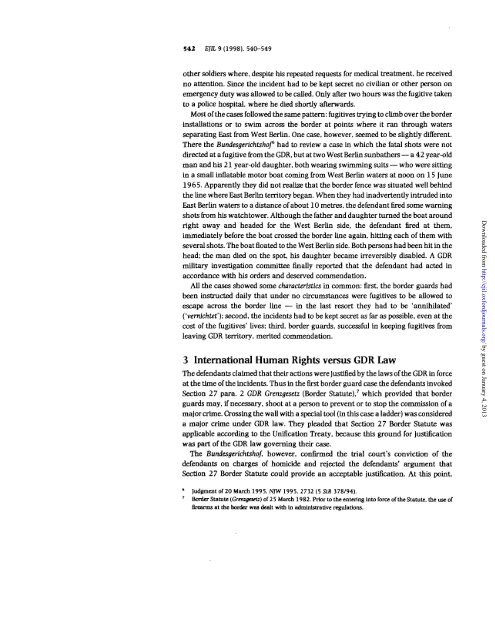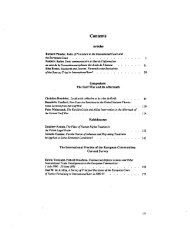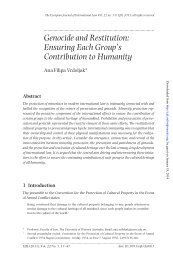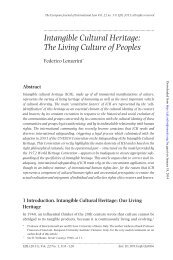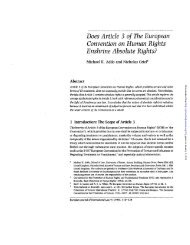The German Border Guard Cases and International Human Rights
The German Border Guard Cases and International Human Rights
The German Border Guard Cases and International Human Rights
You also want an ePaper? Increase the reach of your titles
YUMPU automatically turns print PDFs into web optimized ePapers that Google loves.
542 EJIL 9 (1998), 540-549<br />
other soldiers where, despite his repeated requests for medical treatment, he received<br />
no attention. Since the incident had to be kept secret no civilian or other person on<br />
emergency duty was allowed to be called. Only after two hours was the fugitive taken<br />
to a police hospital, where he died shortly afterwards.<br />
Most of the cases followed the same pattern: fugitives trying to climb over the border<br />
Installations or to swim across the border at points where it ran through waters<br />
separating East from West Berlin. One case, however, seemed to be slightly different.<br />
<strong>The</strong>re the Bundesgerichtshof 1 had to review a case in which the fatal shots were not<br />
directed at a fugitive from the GDR, but at two West Berlin sunbathers — a 42 year-old<br />
man <strong>and</strong> his 21 year-old daughter, both wearing swimming suits — who were sitting<br />
in a small inflatable motor boat coming from West Berlin waters at noon on 15 June<br />
1965. Apparently they did not realize that the border fence was situated well behind<br />
the line where East Berlin territory began. When they had inadvertently Intruded into<br />
East Berlin waters to a distance of about 10 metres, the defendant fired some warning<br />
shots from his watchtower. Although the father <strong>and</strong> daughter turned the boat around<br />
right away <strong>and</strong> headed for the West Berlin side, the defendant fired at them,<br />
immediately before the boat crossed the border line again, hitting each of them with<br />
several shots. <strong>The</strong> boat floated to the West Berlin side. Both persons had been hit in the<br />
head; the man died on the spot his daughter became irreversibly disabled. A GDR<br />
military Investigation committee finally reported that the defendant had acted in<br />
accordance with his orders <strong>and</strong> deserved commendation.<br />
All the cases showed some characteristics in common: first, the border guards had<br />
been instructed daily that under no circumstances were fugitives to be allowed to<br />
escape across the border line — in the last resort they had to be 'annihilated'<br />
('vernichtet'); second, the incidents had to be kept secret as far as possible, even at the<br />
cost of the fugitives' lives: third, border guards, successful in keeping fugitives from<br />
leaving GDR territory, merited commendation.<br />
3 <strong>International</strong> <strong>Human</strong> <strong>Rights</strong> versus GDR Law<br />
<strong>The</strong> defendants claimed that their actions were justified by the laws of the GDR in force<br />
at the time of the Incidents. Thus in the first border guard case the defendants Invoked<br />
Section 27 para. 2 GDR Grenzgesetz (<strong>Border</strong> Statute), 7 which provided that border<br />
guards may, if necessary, shoot at a person to prevent or to stop the commission of a<br />
major crime. Crossing the wall with a special tool (in this case a ladder) was considered<br />
a major crime under GDR law. <strong>The</strong>y pleaded that Section 27 <strong>Border</strong> Statute was<br />
applicable according to the Unification Treaty, because this ground for justification<br />
was part of the GDR law governing their case.<br />
<strong>The</strong> Bundesgerichtshof, however, confirmed the trial court's conviction of the<br />
defendants on charges of homicide <strong>and</strong> rejected the defendants' argument that<br />
Section 27 <strong>Border</strong> Statute could provide an acceptable justification. At this point,<br />
* Judgment of 20 March 1995. NJW 1995. 2732 (5 StR 378/94).<br />
7 <strong>Border</strong> Statute {Grcnzgaetz) of 2 5 March 1982. Prior to the entering Into force of the Statute, the use of<br />
firearms at the border was dealt with In administrative regulations.<br />
Downloaded from<br />
http://ejil.oxfordjournals.org/<br />
by guest on January 4, 2013


